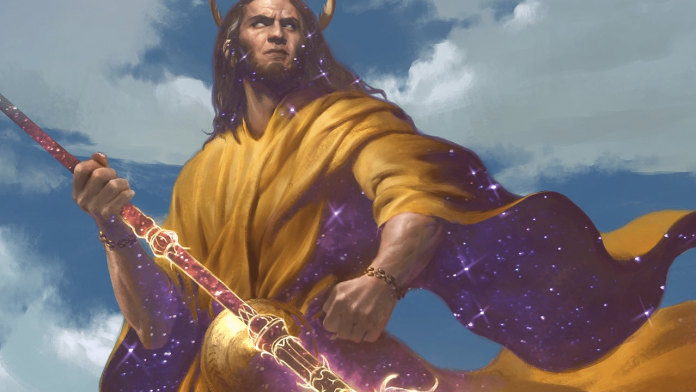
Human history is full of mythology, but thousands of gods were left in the past, as soon as their worshiping civilizations vanished. Gods are like dreams: if no one cherishes them, they cease to exist. Or do they? Indeed, a vast pantheon of gods has disappeared without a trace throughout history, but several stay relevant to this day.
Such is the case of Greek mythology. People may not see temples dedicated to them anymore, but they live on in the gaming industry, where they create quite a splash. Arguably, one of the first games of this kind emerged in 1986, with “Kid Icarus” for NES. Nowadays, there are so many titles based on Greek gods that it’s like the ancient deities have never left. Why does it remain such a popular theme among gamers?
Playing With the Gods
Greek gods have become incredibly powerful in the gaming industry, but not because of divine providence. Greek mythology has all the ingredients for a successful game: compelling storylines, mighty heroes and villains, and, of course, lots of magical power. Undoubtedly, it’s an excellent opportunity for developers to show off lavish visual effects and create even more engaging gameplay.
It doesn’t have to be an AAA title like “Assassin’s Creed: Odyssey” or “Immortals: Fenyx Rising”, where one needs dozens of hours to finish the game. The irresistible appeal of the gods extends to fairly straightforward games, including popular mobile titles like Gates of Olympus. There are all sorts of narratives: from epic battles to Sims-like titles like “Mythwreck: Ambrosia” Island, where the main character “hangs out” with Greek deities who forgot their past and power.
Zeus and Hercules may look intimidating on the screen, but the fairly recent spike in the offer of Greek-inspired games has very mundane reasons. Since 2019, some popular Greek funding programs for game developers have required them to create adventures based on the country’s most ancient tales.
The trick isn’t new, and these programs have most likely followed the footsteps of the UK’s IGDA (International Gaming Developers Association) funding programs for “cultural and educational” games. Indeed, such games can have an educational effect, even if involuntary. Popular titles like God of War may not sound very educational, but they spark a genuine interest in the actual myths and sagas.
The Surreal Factor
Part of the magic surrounding video games is their ability to create entirely new worlds, where everything is possible. Undeniably, ancient mythologies provide the perfect blueprint for such worlds. There are many others, of course. Writers like J. R. R. Tolkien have created highly complex worlds and mythologies themselves (who doesn’t know The Lord of the Rings?), which have also later become video games.
The same goes for sci-fi novels like Dune, Neuromancer, and Metro 2033, which have reached the consoles with varied degrees of success. Part of the popularity stems from the same allure of Greek-based games: fantastically immersive new realities, journey-like storylines, and a handful of cool tricks.
However, sci-fi novels (and consequently, games) have something more: they trigger contemporary fears that a cyberpunk-like dystopia might not be too far down the road. In other words, they are scary because they tend to be more emotionally relatable for players, which arguably explains the genre’s success.
Additionally, both genres can be thought-provoking and instructive. A game like “Age of Mythology” introduces gamers of all ages to the world of mythology (including the Greek), while sharpening the players’ strategic thinking. Meanwhile, Bioshock’s storyline makes some powerful points about how genetic manipulation can go wrong in today’s society, also raising interest in the theme among its fandom.
Sales Battle
While there aren’t statistics regarding the size of each fandom, it’s possible to check the performance of their best-selling game. On the Greek corner, the God of War franchise has sold over 30 million copies already. Cyberpunk 2077, one of the best-selling games based on a sci-fi novel, has also crossed the 30-million mark.
The sales battle could go on indefinitely, pitting the most popular titles of each side against each other. However, such a comparison would be fruitless. In the end, it all boils down to personal preferences, and luckily, both types of gamers have their demands met by AAA titles with adrenaline-infused quests and sinister enemies.
Wronging the Gods
Needless to say, several games use large “poetic license” when borrowing materials from ancient mythology. In this context, timeless stories can be subverted in favor of a more thrilling gameplay. For instance, Hades, the God of the Underworld, is often depicted as evil, even though he is quite benevolent in the actual mythology. Albeit engaging and potentially educational, the stories portrayed in them must be taken with a grain of salt.
A Mighty Pastime
While everybody loves a good story (and a good battle), some may find sci-fi games too unsettling for a pastime. Indeed, many players prefer to escape to a fantasy world rather than live in a much worse version of the real one. So, Zeus and his crew have their place secured in the hearts and minds of millions of gamers worldwide.
Greek gods aren’t relics from the past; they are resilient (over 3,000-year-old) figures, frequently reborn through controllers and screens. Despite the time distance, all adventures feel oddly familiar, as if the Olympian pantheon has never left popular culture. Franchises like Age of Mythology, God of War, and others can entertain players for hours on end, without ever making them fear nuclear catastrophes, plagues, or an Orwellian future riddled by endless wars.
